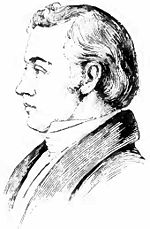Appletons' Cyclopædia of American Biography/Lovejoy, Elijah Parish

|
LOVEJOY, Elijah Parish, abolitionist, b. in Albion, Me., 9 Nov., 1802; d. in Alton, Ill., 7 Nov., 1837. He was the son of a Presbyterian clergyman, was graduated at Waterville college in 1826, and in 1827 went to St. Louis, Mo., and established a school. He contributed prose and verse to the newspapers, was known as a vigorous writer, and in 1829 became editor of a political paper, in which he advocated the claims of Henry Clay as a candidate for the presidency. In 1832, in consequence of a change in his religious views, he decided to become a minister, and, after a course of theological study at Princeton, was licensed to preach by the Philadelphia presbytery on 18 April, 1833. On his return to St. Louis he established a religious paper called the “Observer,” in which he reprobated slavery. Repeated threats of mob violence impelled him to remove his paper in July, 1836, to Alton, Ill. His press was destroyed by mobs three times within a year; yet he procured a fourth one, and was engaged in setting it up, when a mob, composed mostly of Missourians, again attacked the office. With his friends he defended the building, and one of his assailants was killed. After the attacking party had apparently withdrawn, Mr. Lovejoy opened the door, when he was instantly pierced by five bullets and died in a few minutes. His “Memoir” was published by his brothers, Joseph C. and Owen, with an introduction by John Q. Adams (New York, 1838). See, also, “Narrative of Riots at Alton, in Connection with the Death of Lovejoy,” by Edward Beecher (Alton, 1838), and “The Martyrdom of Lovejoy,” by Henry Tanner (Chicago, 1881). — His brother, Owen, abolitionist, b. in Albion, Me., 6 Jan., 1811; d. in Brooklyn, N. Y., 25 March, 1864, worked on his father's farm till he was eighteen years old, and then entered Bowdoin, but left before graduation, emigrated to Alton, Ill., and studied theology. He was present when his brother was murdered, and was moved by that event to devote himself to the overthrow of slavery. He became pastor of a Congregational church at Princeton, Ill., in 1838. Although anti-slavery meetings were forbidden by the laws of Illinois, he openly held them in all parts of the state, announcing at each one the time and place for the next meeting. This course subjected him to frequent fines and to violence and intimidation; but by his eloquence and persistency he won many adherents, and eventually the repressive laws were repealed. He resigned his pastoral charge in 1854 on being elected a member of the legislature. In 1856 he was sent to congress, and was continued there by re-election until his death. At the beginning of the civil war he delivered in the house of representatives a remarkable speech against slavery, in which he recounted the circumstances of his brother's death.
